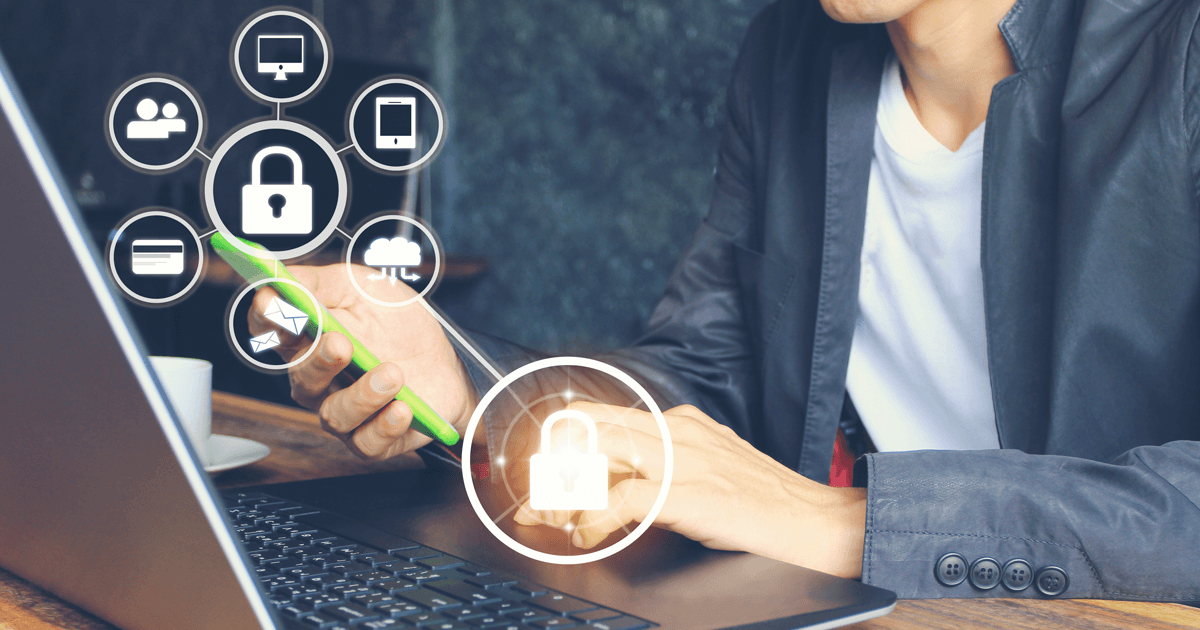October marks Cybersecurity Awareness Month, an international collaboration between governments and private sectors to empower individuals and businesses with the knowledge to protect their personal data from cybercrime. Since 2004, this initiative has been educating people about online safety and the steps everyone can take to stay secure in a digital world. This year’s theme, Secure Our World, emphasizes that simple, practical actions can make a big difference in keeping yourself, your family, and your business safe from online threats.
We’ve all seen headlines about large-scale cyberattacks, and we know it’s easy to feel overwhelmed or unsure of where to start protecting yourself. That’s why we’re here to break it down and share some of the most common cybersecurity topics and tips to stay safe online.
Understanding Cybersecurity
What is cybersecurity?
Cybersecurity is the protection of information systems—whether it’s your computer, network, or personal devices—from criminals, hackers, and unauthorized access. Protecting your personal data is more important than ever as cybercriminals become increasingly sophisticated in their methods. However, despite the growing complexity of attacks, this year’s Secure Our World campaign highlights simple steps everyone can take to defend themselves.
4 Key Ways to Stay Safe Online
- Use Strong Passwords and a Password Manager
Ensure your passwords are complex, unique for each account, and stored securely. A password manager can help generate and store strong passwords so you don’t have to remember them all. Try our free Password Generator to get started. - Turn On Multifactor Authentication (MFA)
MFA adds an extra layer of security by requiring you to confirm your identity through another method, like a text or an app. This means even if someone steals your password, they can’t access your accounts without this additional step. - Recognize and Report Phishing
Be cautious of unsolicited emails, text messages, or phone calls asking for personal information. Cybercriminals often use phishing tactics to steal sensitive data. Learn to recognize red flags, such as urgent requests or suspicious links, and report them when you encounter them. - Update Your Software
Keeping your devices and software up to date is critical. Updates often contain patches for security vulnerabilities that cybercriminals can exploit. Set your devices to update automatically so you never miss important fixes.
Use these 5 steps to protect yourself from a cyber attack:
Cyber threats are usually aimed at accessing, changing, or destroying sensitive information; extorting money from users; or interrupting normal business processes. So, the best way to protect yourself from attack is through proactive steps that fortify your data and your hardware.
- Use strong, unique passwords for each of your accounts – try our free Password Generator to create some and a password manager to store them safely;
- Turn on two-factor authentication (2FA) so that if your password is stolen, cybercriminals still can’t access your accounts without the additional step;
- Recognize and report phishing attempts – be cautious of emails, texts, or phone calls asking for personal information, and don’t click on suspicious links;
- Avoid using public Wi-Fi networks for private browsing without VPN encryption enabled on your device;
- Keep your software updated to protect against vulnerabilities – set automatic updates so you don’t miss any critical patches.
Cybersecurity also includes maintaining awareness of new threats as they emerge through ongoing news monitoring. In other words, read up on the latest data breach, don’t just scroll past the headline.
Cybersecurity Is Everyone’s Responsibility
No matter who you are—whether an individual, business owner, or government official—everyone plays a role in cybersecurity (and anyone can be a victim of cybercrime). It’s important to understand that your actions impact not only your safety but also the security of your family, colleagues, and community.
It’s a good idea to integrate cybersecurity best practices into your daily internet usage. After all, the key to cyber defense is being proactive, not reactive.
- Do not share passwords in plain text, even if a colleague requests it
- Keep up-to-date antivirus software installed
- Scan suspicious or questionable links with a Link Checker before opening them
- Use strong passwords (such as those made up of uppercase letters, lowercase letters, numbers, and symbols)
- Back up files regularly to avoid the sting of ransomware attacks
- Use firewall protection options if available on your computer system
- Run a disposable browsing instance like IPVanish Secure Browser to keep your web activity anonymous and secure by isolating it in the cloud, away from your device
- Install security updates regularly when prompted by your operating system (OS)
- Enable automatic updates whenever possible so they run without requiring you to accept them
The truth is that no one knows when an attack might happen or how long it will take us to notice the breach. It could be tomorrow or in two years; these attacks may even occur when you think you’re safe from them (like weekends). The only way to be prepared is by practicing daily vigilant cybersecurity habits.
Cybersecurity Awareness Month reminds us that protecting our data doesn’t have to be complicated. Simple actions, such as using strong passwords and enabling multifactor authentication, can significantly reduce your risk of falling victim to cybercrime.
Remember, security starts with you. By being proactive and spreading awareness, we can all contribute to a safer, more secure online world.
It’s time to get serious about staying safe online. Direct threats are real and growing. We hope that this post has given you some insight into how important cybersecurity is for both individuals and businesses. If you would like more information or want to get involved in helping protect others from cybercrime, the Cybersecurity Awareness Month official toolkits offer a helpful starting point.
